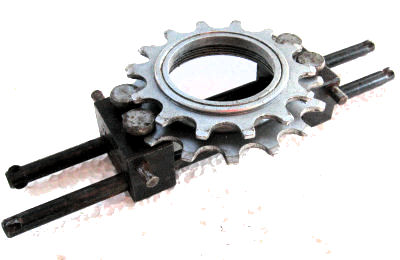By the time I returned to Portland and began working at Citybikes a year later, I knew how to overhaul and/or tune up a bicycle with derailleurs, caliper brakes and friction shifting. I would complete my apprenticeship (though not my education -- that would never be done) by learning how to overhaul three-speed hubs and deal with indexed shifting.
In the years between 1995 and 2012, when I worked full-time in the bike industry, I enjoyed a healthy worker discount that allowed me to buy and try all sorts of things, including different brake systems, cargo bikes, various trailers, and all manner of raingear and waterproof panniers.
When I left the industry in 2012, I was outfitted with far more than I actually needed, including five bicycles (the most I'd ever owned) and buckets of random parts, plus a full set of shop tools for my own use.
Five years later, I still have most of the tools, and have pared myself down to two bikes that I regularly ride. There's a trailer, too; but I use it so infrequently that I'm considering selling it, or trading it for a smaller trailer.
The upshot of all this is that, during my time in the industry, I got to try out all sorts of technologies as they passed through the shop, and learn about how they worked in real-life riding. And unlike many bicycle mechanics who've kept bits of everything they've ever tried, my nearly twenty years in the industry made me wary of every new thing that came down the pike. I disdained the racing-influenced, trickle-down of technologies that infected ordinary transportational bicycles. As more repairable metal components transitioned to throw-away plastic parts, I realized that many of the skills I had acquired early on were becoming obsolete. No one cared anymore if I could overhaul a freewheel; freewheels were relics of another age. No one cared anymore if Iknew how to replace the main spring in a rear derailleur; rear derailleurs became so cheaply made that they could simply be removed and replaced when the spring wore out -- and newer models had springs that were harder to remove by design, the bicycle industry's blatant version of a planned obsolescence which I came to loathe.
(below: photo of freewheel disassembly. Only serious hobbyists actually bother to do this anymore.)

(below: another, less ideal way to disassemble a freewheel. Does anyone even USE this old Park tool anymore?)
Today, I am quite happy to be done with the bike industry, and with the crow-like obsession with every shiny, new thing that manufacturers release each year. At home, I keep a small supply of old friction derailleurs and shifters, old canti and enttry-level V-brakes and levers; and just enough brake and gear cables and housing to allow me to fix up old bikes for refugee resettlement on my part-time, hobby-level basis. I am down to two bikes, and they both have friction shifting and freewheels; in fact, I've overhauled enough used freewheels to likely see me out, each one oiled and carefully wrapped in a plastic bag to keep from rusting in storage.
(below: photo of a freewheel vise, used to overhaul and swap cogs from threaded freewheels)

I have more than enough bike stuff these days. And anytime I feel like I have too much, I winnow down.
That's why this Monday morning, I'm having a Labor Day bike parts sale, to clear out whatever feels "extra" and could be of use somewhere else. I still fix up old bikes (though I'll take a break for the Jewish High Holy Days), don't worry. I just do it on a smaller scale that's more manageable and keeps me relatively stress-free.
Owning isn't nearly as much fun as riding.
So wherever you are this weekend, enjoy the ride.

3 comments:
I have a pin wrench for the dust caps on a Spécialités TA crank set. Works like a charm!
I wonder how much of the "new and shiny" bit market is driven by the opinions on the internet. For example, I have read about V-brakes having no modulation, or being to "grabby". If I were a novice trying to discern what works and what does not, I may be tempted to stay away from V-brakes and move to disc brakes, etc. V-brakes work really well, and in my opinion are much easier to set up than Cantilever brakes, but one could believe otherwise based on internet discussion. The list goes on with other parts as well. Thanks for this and your other posts on the bike industry. Jay
Very interesting post...Thanks.
Post a Comment